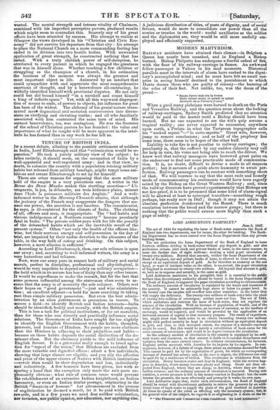TENURE OF BRITISH INDIA.
IN a recent debate, alluding to the possible settlement of soldiers in India, Lord Ellenborough said that "colonization would be se- paration." He took a purely military view of the subject : he relies entirely, it should seem on the occupation of India by a well-appointed and well-regulated army : and in that view, no doubt, to colonize the country with a population retainig military habits but released from military bondage, might tempt some am- bitious and errant Ellenborough to set up for himself.
There are other reasons for supposing that the mere military hold of the empire is a very precarious one. A writer in the Revue des Deux Mondes makes this startling assertion—"
vrognerie, le jeu, la debauche, ces trois hidieuses plaies' minent dens l'Inde la puissance militaire des Anglais." And a well- informed writer in the Morning Chronicle admits, that although the jealousy of the French may exaggerate the dangers that me- trace our power, the assertion is not baseless. The commissariat, he says, is ill-contrived for the climate of India. The clothing of all, officers and men, is inappropriate. The "bad habits and vicious indulgences of a Northern country " become peculiarly fatal in India. "The private soldier pays with his life the penalty of the debauched habits which are the inevitable result of the present system." Often "not only the health of the officers like- wise, but their nervous energy and self-possession in the day of trial, are impaired by their undue devotion to the pleasures of the table, in the way both of eating and drinking. On this subject, however, a mere allusion is sufficient."
According to Lord Ellenborough, then, our sole reliance is upon our army ; and, according to well-informed writers, the army is a wry hazardous and bad reliance.
Now, were our army pure in respect both of military and social morals perfect in discipline, professional and physiological, it would he very impolitic to depend solely on military occupation— the hold which in its nature has less of fixity than any other tenure. It would be superfluous to make the remark, but for the fact that some persons influential among the statesman class seem to as- sume that the army is of necessity the sole reliance. Others rest their hopes on "good government "—just and wise administra- tion; an excellent adjunct—a hold far more searching in taking root than simple military possession. But even the best admin- istration by an alien government is precarious in tenure. To secure a hold—to identify British and Indian interests—India should be identified,)bodily and morally, with the British empire.
This is less a task for political institutions, or for set moralists, than for those who can directly and practically influence social relations. The Governors of India have sought far too slightly to identify the English Government with the habits, thoughts, interests, and honours of Hindoos. No people are more obstinate than the Hindoos in adhering to their prejudices and habits— because on those habits depends the social distinction of the do- minant class. But the obstinacy yields to the mild influence of English favour. It is a grievance really enough to breed agita- tion for "repeal of the union," that Hindoos are excluded from the most valuable and dignified offices : admit a few individuals, showing that large classes are eligible, and you ally the affection and pride of the upper classes of Natives with British institutions —revolt then would be their degradation and loss, individually and collectively. A few honours have been given, but with so sparing a hand that the exception only made the rule more un- pleasantly obvious: what rule of common sense would prevent the establishment of an extensive Indian knighthood, an Indian baronetcy, or even an Indian titular peerage, originating in the -British "fountain of honour." Let advancement in the process of anglicization be (teemed a merit, let it be paid with -British rewards, and in a few years we need fear neither colonization, nor invasion, nor public opinion, nor education, nor anything else.
A judicious distribution of titles, of posts of dignity, and of social favour, would do more to consolidate our power than all the armies or treaties in the world : useful auxiliaries as the soldier and the diplomatist are, they would be still more usefully em- ployed and efficiently supported.
























 Previous page
Previous page